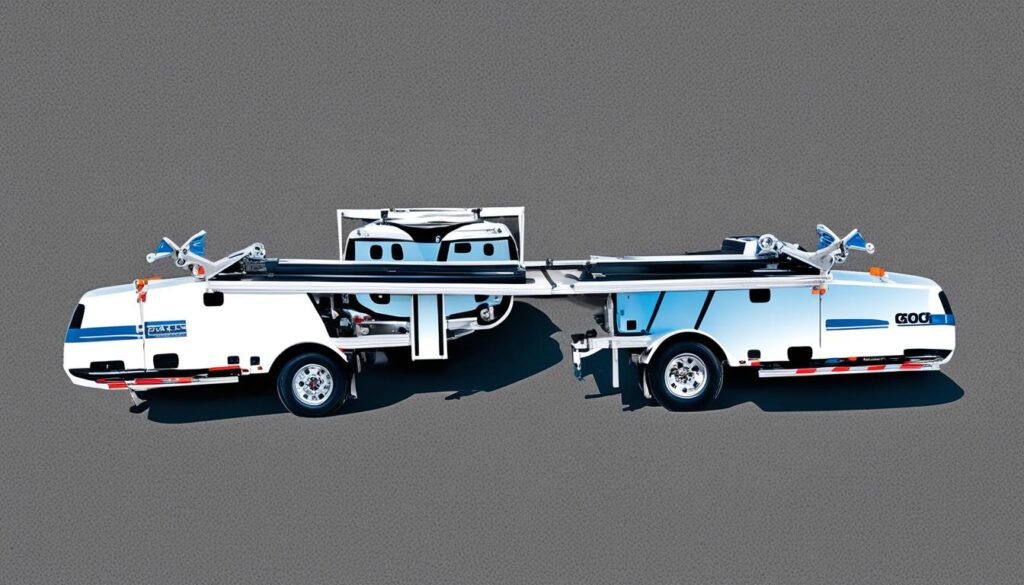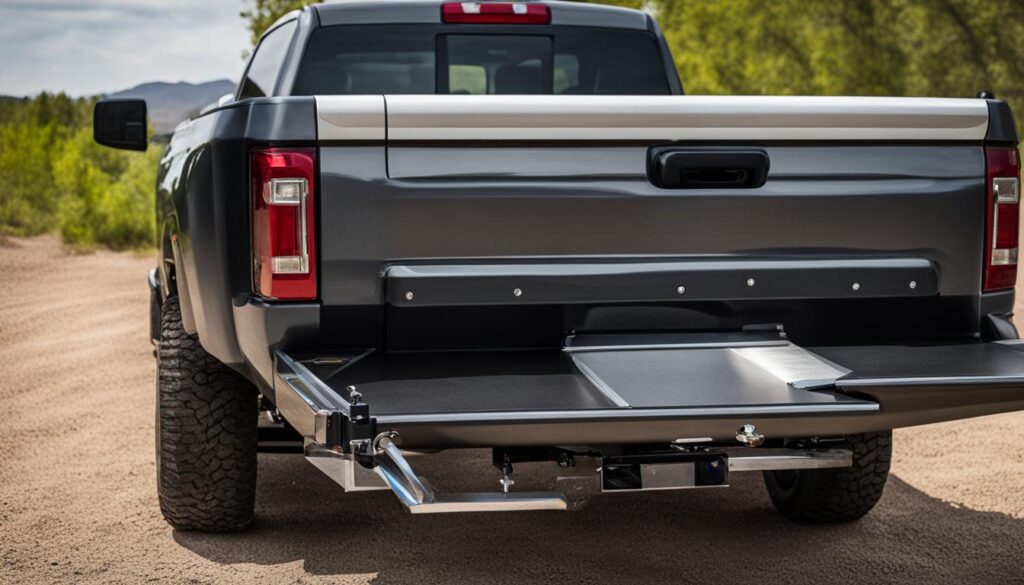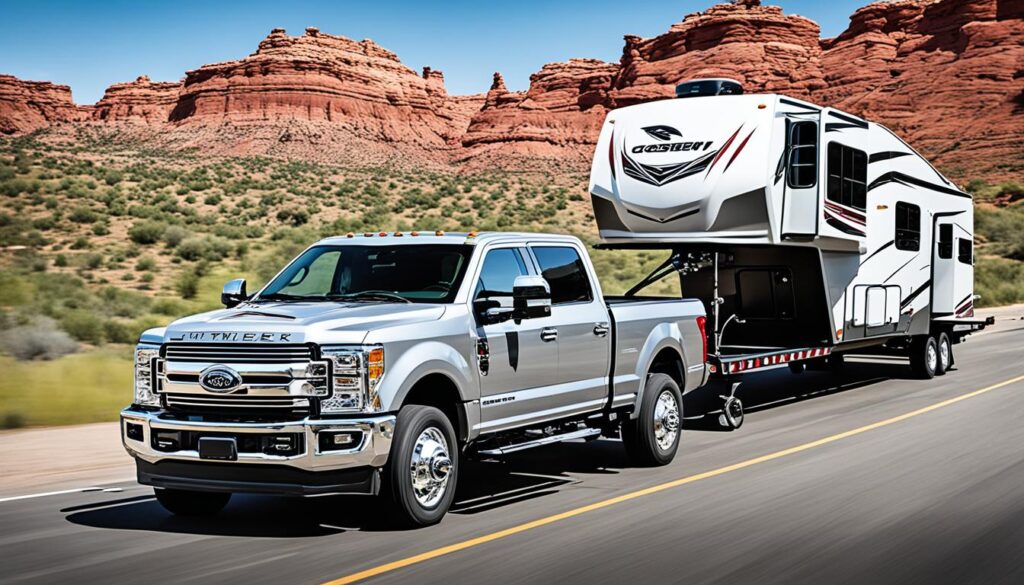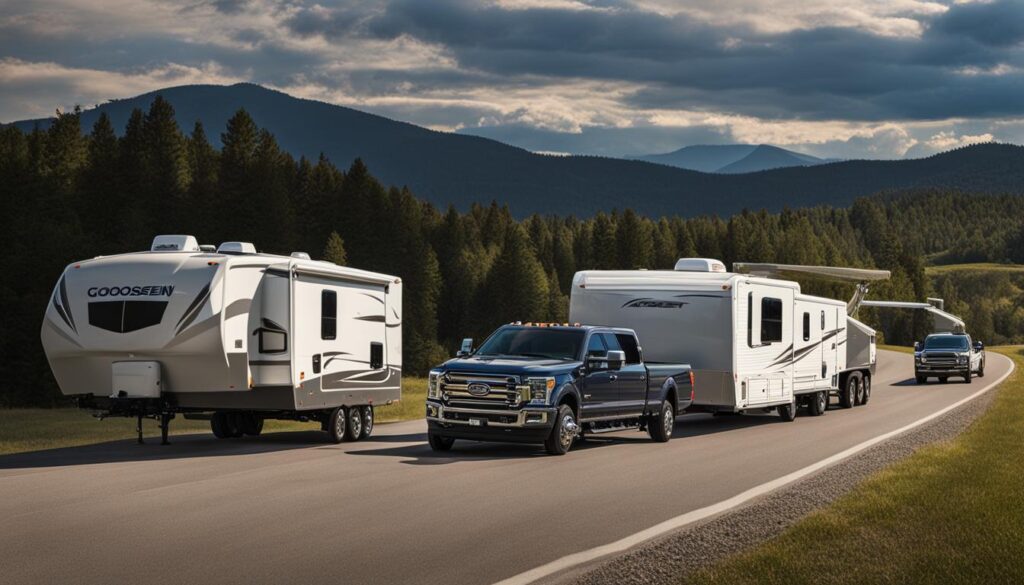When it comes to towing trailers, one of the key decisions to make is choosing the right hitch. Two popular options are gooseneck hitches and fifth wheel hitches. But what exactly is the difference between these two? How do their hitch options, towing capacity, and stability compare? And which one is best for your RV towing or camper trailer needs?
In this article, I will dive deep into the world of gooseneck and fifth wheel hitches, exploring their pros and cons, hitch features, and the trailers they are usually used with. By the end, you’ll have a clear understanding of which option suits your towing requirements.
Key Takeaways:
- Gooseneck hitches use a ball and coupler connection, while fifth wheel hitches use a jaws and kingpin connection.
- Gooseneck hitches are minimally invasive in the truck bed and generally less expensive compared to fifth wheel hitches.
- Gooseneck hitches are commonly used for commercial towing and agriculture, while fifth wheel hitches are popular for recreational towing, especially for RV travel trailers and campers.
- Gooseneck hitches offer advantages such as minimal invasiveness, lightweight, and a simple coupling mechanism. Fifth wheel hitches provide smoother and more stable towing and a wider variety of weight capacity options.
- If you already have a gooseneck hitch and want to tow a fifth wheel trailer, you can use a gooseneck to fifth wheel adapter plate or a fifth wheel gooseneck hitch.
Contents
Gooseneck Hitch Features
A gooseneck hitch is a versatile towing option that offers several notable features. It utilizes a ball and coupler connection, providing a secure attachment between the truck and the trailer. The ball and coupler connection ensures stability and reduces the risk of the trailer detaching during transportation.
One significant advantage of a gooseneck hitch is its minimally invasive nature. Unlike bulky fifth wheel hitches, gooseneck hitches occupy less space in the truck bed, allowing for more usable space when not towing. This feature is particularly beneficial for those who require a truck bed for other purposes such as hauling equipment or supplies.
Another advantage of gooseneck hitches is their affordability. In comparison to fifth wheel hitches, gooseneck hitches are generally less expensive. This makes them an attractive option for individuals who want a reliable towing solution without breaking the bank.
Gooseneck hitches are commonly used in commercial towing and agriculture. They are especially well-suited for livestock trailers and flatbed trailers. The gooseneck hitch’s secure attachment and stable towing capabilities make it ideal for transporting large loads commonly found in these industries.
Overall, gooseneck hitches offer a practical towing solution with their ball and coupler connection, minimally invasive design, affordability, and suitability for commercial and agricultural applications.
“A gooseneck hitch provides a secure attachment and minimally invasive towing solution for commercial and agricultural applications.”
| Features | Advantages |
|---|---|
| Ball and coupler connection | Secure attachment |
| Minimally invasive design | More usable space in the truck bed |
| Less expensive | Affordable towing option |
| Commonly used for commercial towing and agriculture | Suitable for livestock trailers and flatbed trailers |
5th Wheel Hitch Features
A 5th wheel hitch is an essential component for towing RV travel trailers and campers. With its unique jaws and kingpin connection, this hitch provides enhanced stability during transportation, ensuring a smooth and secure towing experience.
The jaws and kingpin connection of a 5th wheel hitch create a strong and reliable attachment between the towing vehicle and the trailer. The jaws firmly grasp the kingpin of the trailer, preventing excessive movement and maintaining a stable connection throughout the journey.
This enhanced stability is particularly beneficial for recreational towing, as it ensures a smooth and safe ride for both the driver and passengers. Whether you’re embarking on a cross-country road trip or exploring your favorite campsite, a 5th wheel hitch guarantees a secure towing experience.
Due to their heavy-duty construction, 5th wheel hitches are specifically designed to handle the weight and size of large recreational vehicles. They provide the necessary strength and durability to tow RV travel trailers and campers with confidence, allowing you to fully enjoy your outdoor adventures.
So, if you’re planning a camping trip with your family or embarking on a solo RV adventure, investing in a quality 5th wheel hitch is essential. Its enhanced stability, seamless towing, and compatibility with RV travel trailers and campers make it the ideal choice for recreational towing enthusiasts.

Advantages of Gooseneck Hitches
Gooseneck hitches have become increasingly popular in agriculture and commercial towing due to their numerous advantages. These hitches offer a range of benefits that make them a practical choice for those in these industries.
Minimally Invasive Design
One of the key advantages of gooseneck hitches is their minimally invasive nature in the truck bed. Unlike fifth wheel hitches that can take up a significant amount of space, gooseneck hitches are designed to occupy minimal space. This allows for greater versatility and flexibility when the truck is not in use for towing. With a gooseneck hitch, you can easily utilize your truck bed for other purposes without obstruction.
Lightweight and Easy to Operate
Gooseneck hitches are known for their lightweight construction, making them easier to install and operate. Their lighter weight also means less strain on your truck’s suspension and improved fuel efficiency. Whether you’re connecting or disconnecting a trailer, the lightweight design of gooseneck hitches simplifies the process and saves you time and effort.
Simple Coupling Mechanism
Another advantage of gooseneck hitches is their simple coupling mechanism. These hitches use a ball and coupler connection, which provides a secure and reliable attachment between the truck and the trailer. The simplicity of this coupling mechanism ensures a quick and hassle-free connection, allowing you to get on the road faster.
Ideal for Agriculture and Commercial Towing
The advantages of gooseneck hitches make them particularly well-suited for agricultural and commercial towing. Their minimally invasive design and simple coupling mechanism make them a practical choice for heavy-duty trailers used in these industries. Whether you’re hauling livestock, flatbeds, or other commercial loads, gooseneck hitches provide a solid connection and reliability.
With their minimally invasive nature, lightweight construction, simple coupling mechanism, and suitability for agriculture and commercial towing, gooseneck hitches offer a compelling choice for those in these industries.

| Advantages of Gooseneck Hitches |
|---|
| Minimally invasive design |
| Lightweight and easy to operate |
| Simple coupling mechanism |
| Ideal for agriculture and commercial towing |
Advantages of 5th Wheel Hitches
When it comes to towing options, 5th wheel hitches offer several advantages over gooseneck hitches. These hitches are designed to provide a smoother and more stable towing experience, making them an ideal choice for recreational towing, especially for RVs and large campers.
One of the key advantages of 5th wheel hitches is their superior towing performance. With a pivoting head plate and jaws that securely hold the kingpin, 5th wheel hitches provide a smoother towing experience compared to gooseneck hitches. This enhanced stability translates into a more enjoyable and controlled ride, ensuring peace of mind during your recreational adventures.
Furthermore, 5th wheel hitches offer a wide variety of weight capacity options. Whether you need to tow a lightweight camper or a heavy RV, there’s a 5th wheel hitch available that matches your specific towing needs. This versatility allows you to tow a range of recreational vehicles without compromising performance or safety.
Advantages of 5th Wheel Hitches:
- Smoother and more stable towing
- Wide variety of weight capacity options
For those who prioritize a smoother towing experience and require a range of weight capacities, 5th wheel hitches are the ideal choice. Their enhanced stability and versatile options make them a popular and reliable option for recreational towing.

Gooseneck vs 5th Wheel Pros and Cons
Both gooseneck hitches and 5th wheel hitches have their own set of pros and cons. Gooseneck hitches are less invasive in the truck bed, relatively less expensive, and have a simple coupling mechanism. They are well-suited for agriculture and commercial towing. However, they require hole saw drilling in the truck bed, may have less stability for tall trailers, and can be noisier compared to 5th wheel hitches.
On the other hand, 5th wheel hitches offer smoother and more stable towing, a variety of weight capacity options, and sliding options for short-bed trucks. They are great for RVs and recreational towing. However, they can be heavy and difficult to move, relatively more expensive, and require permanent truck bed base rails.
It’s important to consider these pros and cons when deciding which hitch option is best for your towing needs.
| Gooseneck Hitches | 5th Wheel Hitches |
|---|---|
| Less invasive in the truck bed | Offers smoother and more stable towing |
| Relatively less expensive | A variety of weight capacity options |
| Simple coupling mechanism | Sliding options for short-bed trucks |
| Well-suited for agriculture and commercial towing | Great for RVs and recreational towing |
| Require hole saw drilling in the truck bed | Can be heavy and difficult to move |
| May have less stability for tall trailers | Relatively more expensive |
| Can be noisier | Require permanent truck bed base rails |
Gooseneck to Fifth Wheel Adapter
If you already have a gooseneck hitch and want to tow a fifth wheel, you have two options for converting your towing setup.
One option is to use a gooseneck to fifth wheel adapter plate. This adapter plate is designed to drop into the gooseneck hitch hole and provide a set of industry-standard fifth wheel rails. This allows you to use a fifth wheel hitch with your existing gooseneck hitch setup.
The other option is to use a fifth wheel gooseneck hitch, designed to fit into industry-standard fifth wheel base rails. These hitches provide a standard gooseneck ball for towing.
Both options provide a convenient way to switch between towing a gooseneck trailer and a fifth wheel trailer.
In text must include SEO relevant keywords – gooseneck to fifth wheel adapter, adapter plate, gooseneck gooseneck hitch, fifth wheel gooseneck hitch, towing setup.
Fifth Wheel vs Gooseneck Trailer
When comparing fifth wheel trailers and gooseneck trailers, it’s important to understand the differences in their coupling mechanisms. Fifth wheel trailers utilize a kingpin and pin box connection, similar to what you would find on a semi-truck hitch. This type of hitch provides a secure attachment point between the trailer and the truck, ensuring stability and safe towing.
In contrast, gooseneck trailers feature a vertical coupler that latches onto a gooseneck hitch ball, similar to a bumper-pull coupler. This type of coupling mechanism is commonly seen on smaller trailers. While it may not offer the same level of stability as a fifth wheel hitch, it still provides a secure connection for towing.
These differences in the coupling mechanisms of fifth wheel and gooseneck trailers also result in different towing options and compatibility with various hitches. Fifth wheel trailers are designed specifically for use with fifth wheel hitches, while gooseneck trailers require a gooseneck hitch for towing.
It’s crucial to match the correct trailer with the appropriate hitch to ensure safe and secure towing. Considering factors such as the weight and size of the trailer, as well as the towing capacity of the vehicle, will help determine which type of trailer and hitch combination is best suited for your specific needs.
FAQ
What is the difference between a gooseneck and a fifth wheel hitch?
Gooseneck hitches use a ball and coupler connection, while fifth wheel hitches use a jaws and kingpin connection. Additionally, gooseneck hitches are minimally invasive in the truck bed, while fifth wheel hitches are bulkier.
What are the features of a gooseneck hitch?
Gooseneck hitches feature a ball and coupler connection, which is minimally invasive in the truck bed. They are less expensive compared to fifth wheel hitches and are commonly used for commercial towing and agriculture, particularly for livestock trailers and flatbed trailers.
What are the features of a fifth wheel hitch?
Fifth wheel hitches feature a jaws and kingpin connection, which provides enhanced stability when towing. They are designed for recreational towing, particularly for RV travel trailers and campers.
What are the advantages of gooseneck hitches?
Gooseneck hitches are minimally invasive in the truck bed, lightweight, and have a simple coupling mechanism. They are ideal for agriculture and commercial towing.
What are the advantages of fifth wheel hitches?
Fifth wheel hitches offer smoother and more stable towing and come in a variety of weight capacity options. They are great for recreational towing, particularly for RVs and large campers.
What are the pros and cons of gooseneck hitches versus fifth wheel hitches?
Gooseneck hitches are less invasive and less expensive, but they may be less stable for tall trailers and can be noisier. Fifth wheel hitches offer smoother towing and more weight capacity options, but they can be heavy and require permanent truck bed base rails.
How can I convert my gooseneck hitch to tow a fifth wheel?
You can use a gooseneck to fifth wheel adapter plate or a fifth wheel gooseneck hitch to convert your towing setup.
What’s the difference between a fifth wheel trailer and a gooseneck trailer?
Fifth wheel trailers use a kingpin and pin box to connect to the fifth wheel hitch, while gooseneck trailers have a vertical coupler that latches onto the gooseneck hitch ball.






